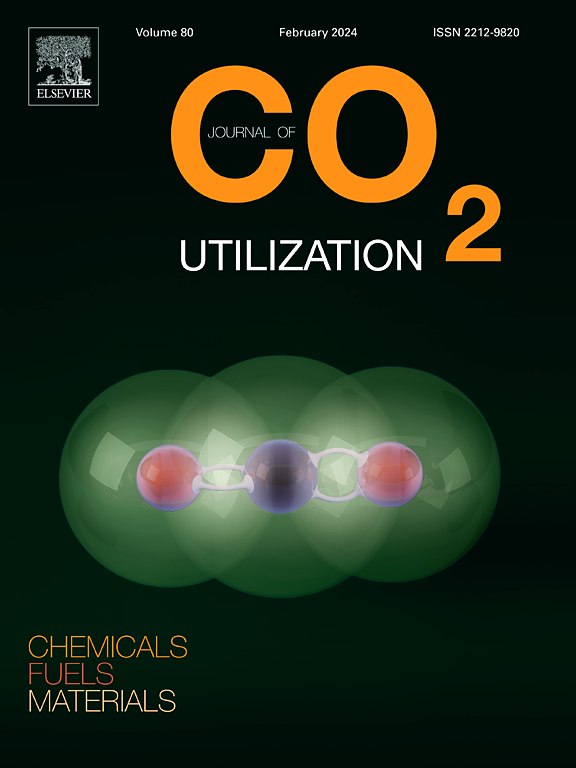Cu/ZnO/Al2O3催化剂的催化性能和氢溢出:碱和碱土氧化物促进剂对CO2加氢的DFT计算
IF 7.2
2区 工程技术
Q1 CHEMISTRY, MULTIDISCIPLINARY
引用次数: 0
摘要
本研究评价了K2O、BaO、Cs2O和SrO对Cu/ZnO/Al2O3催化剂CO2加氢制甲醇的催化作用,重点考察了合成方法的影响。在工业条件下对共沉淀法和浸渍法制备的催化剂的活性、选择性和稳定性进行了评价。分析(H2- tpr, H2/CO2- tpd, XRD)表明,钾和钡通过强的促进剂-载体相互作用改善了铜的还原性,增强了H2/CO2吸附,减少了烧结。共沉淀钾表现出了优异的性能,实现了更高的甲醇产量、更好的稳定性和最小的失活,甲醇选择性超过86% %,二氧化碳转化率超过42% %。相反,浸渍钾增加了CO的形成,突出了合成策略的意义。DFT计算表明,K2O和BaO促进了较强的H2/CO2吸附和有利的反应途径。这些发现为优化促进剂的选择和先进催化剂的合成技术,实现高效的二氧化碳转化和可持续的甲醇生产提供了有价值的见解。本文章由计算机程序翻译,如有差异,请以英文原文为准。
Catalytic performance and hydrogen spillover in Cu/ZnO/Al2O3: Insights from DFT calculations on alkali and alkaline earth oxides promoters for CO2 hydrogenation
This study evaluates Cu/ZnO/Al2O3 catalysts promoted with K2O, BaO, Cs2O, and SrO for CO2 hydrogenation to methanol, focusing on the effect of synthesis methods. Catalysts prepared via co-precipitation and impregnation were evaluated for activity, selectivity, and stability under industrial conditions. Analyses (H2-TPR, H2/CO2-TPD, XRD) showed potassium and barium improve copper reducibility, enhance H2/CO2 adsorption, and reduce sintering through strong promoter-support interactions. Co-precipitated potassium demonstrated superior performance, achieving higher methanol production rates, improved stability, and minimal deactivation, with methanol selectivity exceeding 86 % and CO2 conversion surpassing 42 %. In contrast, impregnated Potassium increased CO formation, highlighting the significance of the synthesis strategy. DFT calculations revealed that K2O and BaO promote strong H2/CO2 adsorption and favorable reaction pathways. These findings offer valuable insights into optimizing promoter selection and synthesis techniques for advanced catalysts, enabling efficient CO2 conversion and sustainable methanol production.
求助全文
通过发布文献求助,成功后即可免费获取论文全文。
去求助
来源期刊

Journal of CO2 Utilization
CHEMISTRY, MULTIDISCIPLINARY-ENGINEERING, CHEMICAL
CiteScore
13.90
自引率
10.40%
发文量
406
审稿时长
2.8 months
期刊介绍:
The Journal of CO2 Utilization offers a single, multi-disciplinary, scholarly platform for the exchange of novel research in the field of CO2 re-use for scientists and engineers in chemicals, fuels and materials.
The emphasis is on the dissemination of leading-edge research from basic science to the development of new processes, technologies and applications.
The Journal of CO2 Utilization publishes original peer-reviewed research papers, reviews, and short communications, including experimental and theoretical work, and analytical models and simulations.
 求助内容:
求助内容: 应助结果提醒方式:
应助结果提醒方式:


